diarrhea support
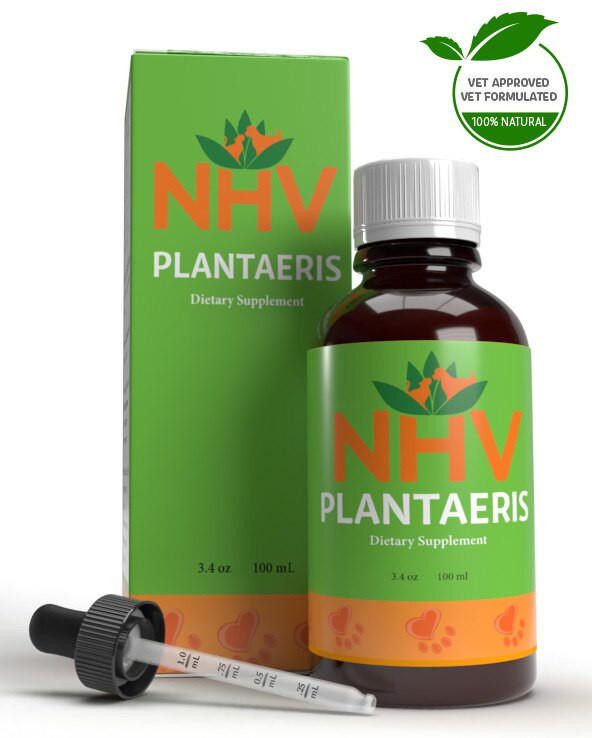
free shipping over $100 (USA & Canada)
1-877-937-4372 the pet expert hotline
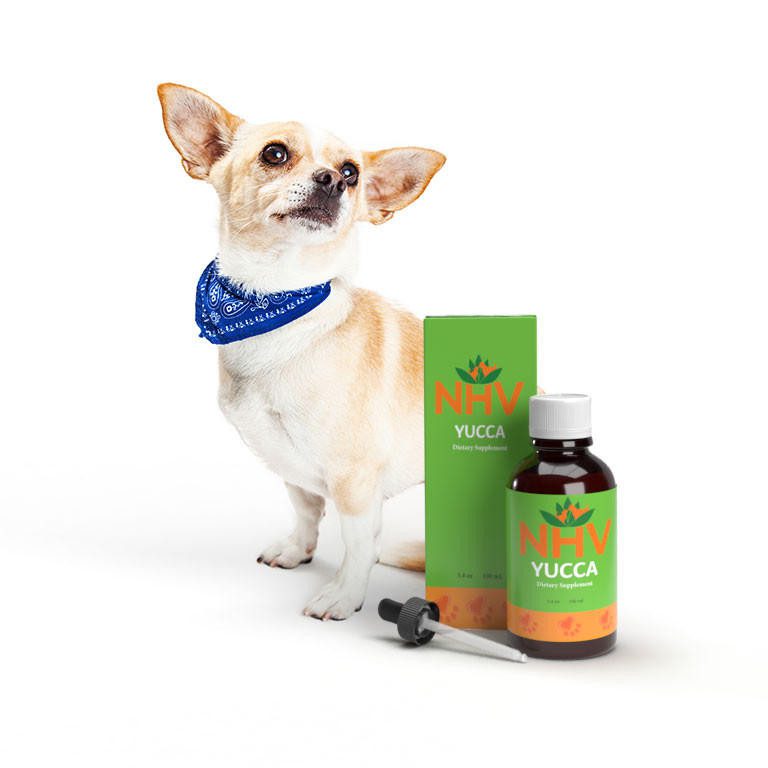
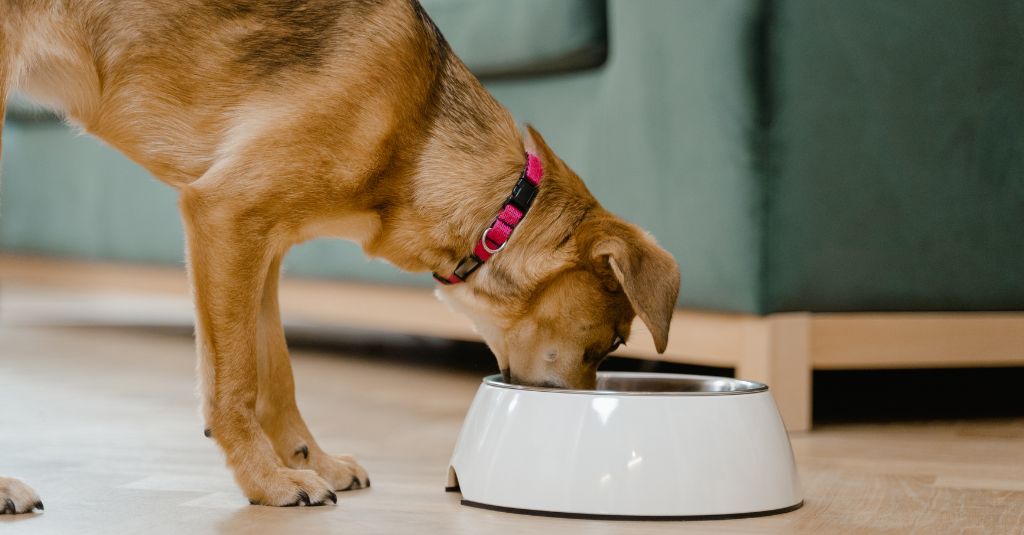
When pet parents hear about gut imbalance in pets, they typically think of digestive issues like diarrhea, vomiting, or bloat. However, the gut plays a much broader role in your pet’s overall health. A balanced digestive system supports skin health, mood, and immune function. When that balance is disrupted, it can show up in unexpected ways, sometimes without any obvious digestive symptoms. Let’s explore how gut imbalances in pets affect the skin, behavior, and immune system, and what you can do to support your furry friend naturally.
Gut imbalance happens when the healthy microorganisms in the digestive system, known as the microbiome, get out of sync. This can be caused by things like poor diet, stress, antibiotics, illness, or even age.
Some of the most common signs of gut imbalance in pets are:

Even if your pet’s digestion seems normal, the gut could still be struggling, especially if you’re seeing skin flare-ups or mood changes.
Your pet’s skin is one of the first places where a gut imbalance may show up. That’s because the gut is involved in regulating inflammation throughout the body. When the digestive system isn’t working properly, it can trigger an inflammatory response that affects the skin.
If your pet is experiencing skin issues, it could be worth considering their gut health
If your pet is experiencing skin issues, it could be worth considering their gut health. Signs to watch for include constant itching or scratching, which can indicate discomfort. Additionally, a dry, flaky, or greasy coat may suggest underlying health problems. Be attentive to any hot spots or rashes that appear, as these can also signal issues related to gut health.
Chronic ear infections are another red flag, as they might not only be local problems but could stem from systemic issues. Finally, if your pet is having allergic reactions without a clear cause, this could further indicate that their skin problems are connected to their digestive health.
This gut-skin connection means that addressing the root cause, supporting a healthy microbiome, may help relieve recurring skin conditions from the inside out.
The gut and brain are closely connected through what’s known as the “gut-brain axis.” This is a communication pathway that links your pet’s digestive system with their nervous system. In fact, many of the body’s mood-regulating chemicals, like serotonin, are produced in the gut.

When the gut is out of balance, it can affect your pet’s emotional health and behavior. You might notice:
Supporting gut health in pets can enhance mood regulation and help them feel more balanced and content.
A large part of your pet’s immune system resides in the gut. The intestinal lining and microbiome help form the body’s first line of defense against harmful bacteria, viruses, and toxins. When the gut is healthy, it supports the immune system in responding properly to threats. But if gut balance is disrupted, the immune system can become either overactive, leading to allergies and inflammation, or underactive, making your pet more vulnerable to infections.
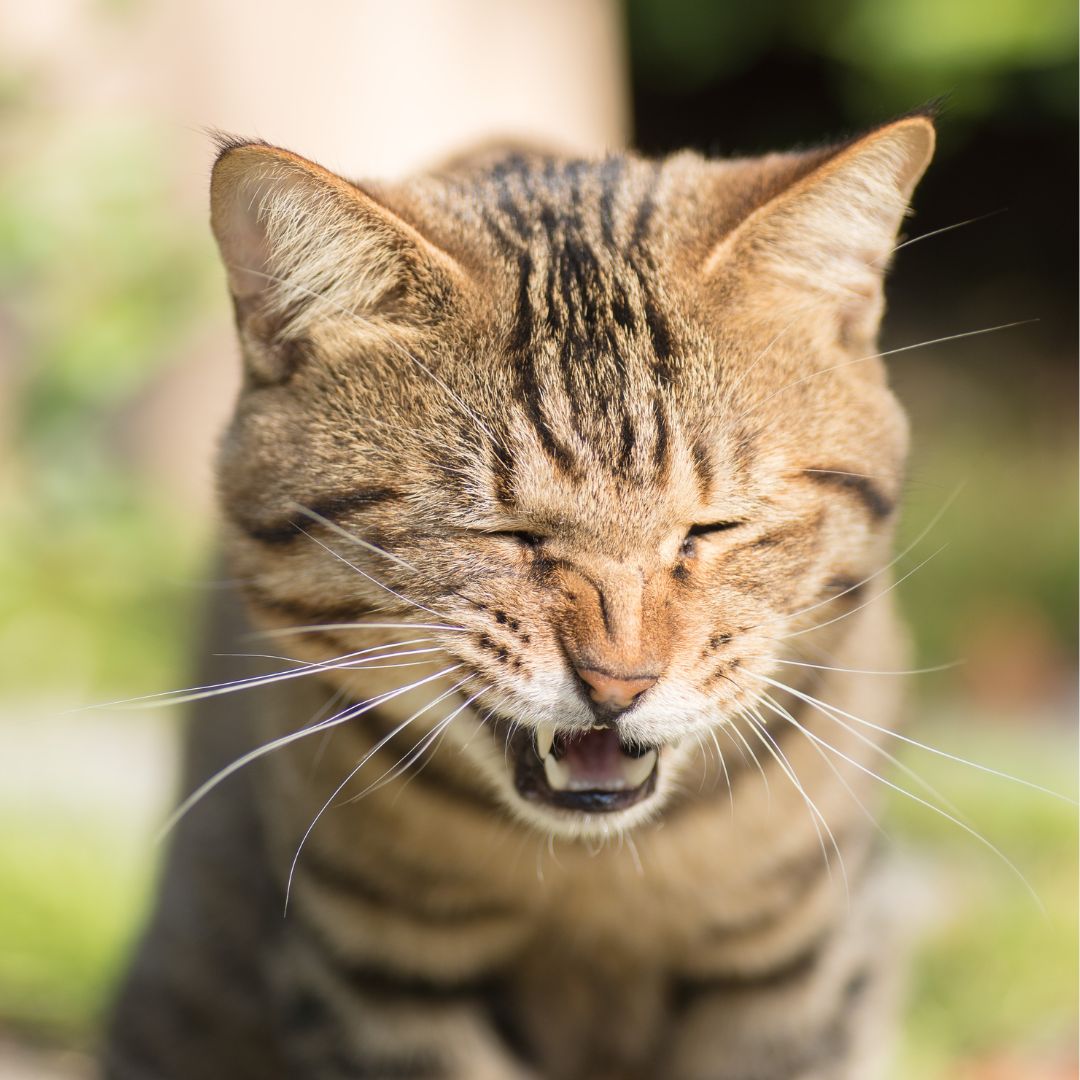
If your dog or cat often feels unwell, has difficulty healing minor wounds, or experiences seasonal or environmental allergies, it may be time to consider their digestive health as an essential part of the overall picture. Digestive health is vital for your pet’s well-being, as it can significantly impact their immune system and recovery from various conditions. Addressing any underlying digestive issues could offer helpful insights and solutions to improve your pet’s overall health and vitality.
At NHV, we understand that good health begins in the gut. Our range of holistic pet supplements is formulated by veterinarians and herbalists to gently support digestive health and promote overall wellness.
Here are some of our most-loved options for gut health:
Good gut health is crucial for your pet’s overall well-being
Maintaining good gut health is crucial for your pet’s overall well-being, going beyond just their diet. If you notice any unexplained skin problems, mood changes, or recurring illnesses in your pet, it could be helpful to consider the possibility of a gut imbalance in pets. Addressing this can result in significant improvements in your pet’s health and happiness.
By supporting a healthy microbiome through diet, lifestyle, and natural supplementation, you’re giving your pet the best chance at a long, happy, and healthy life.
diarrhea support

Natural Relief for Diarrhea and Inflammatory Bowel Disease (IBD)
buy 2 and save $3
3 month supply for a small to medium size pet
Plantaeris is a natural dog diarrhea remedy that works quickly and gently to support the relief of digestive disorders and the associated symptoms.

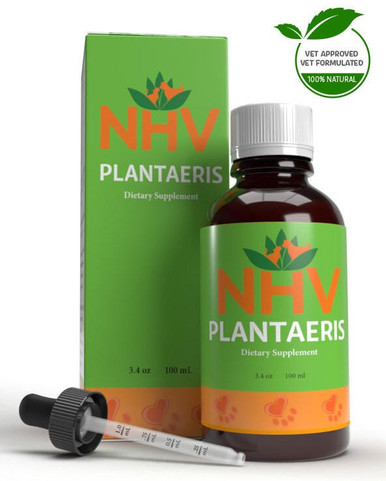
Plantaeris is a natural dog diarrhea remedy that works quickly and gently to support the relief of digestive disorders and the associated symptoms.

Reduce intestinal upset and diarrhea with Plantaeris, a fast-acting, gentle, herbal, natural dog diarrhea remedy that will help your pet feel better in no time. Plantaeris is designed to help reduce symptoms of diarrhea.
Diarrhea is a symptom of digestive disorders. In dogs, it can be caused by inflammatory bowel disease, food allergies, or parasites such as giardia. Help your pet with Plantaeris dog diarrhea supplement and ensure they have plenty of fluids to prevent dehydration.
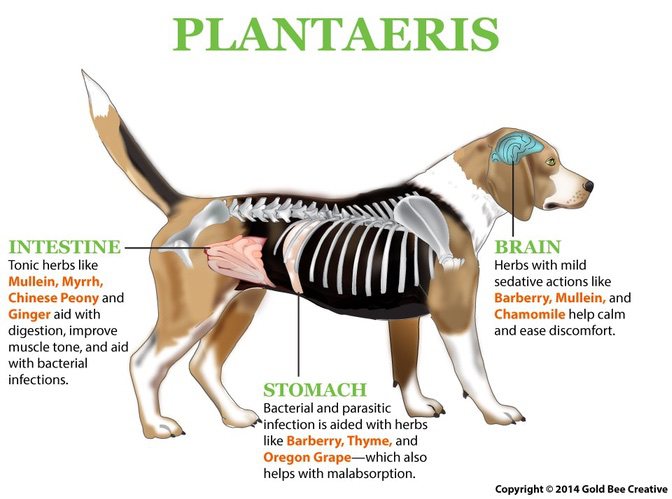
Barberry – Treats inflammation and infections.
Mullein – Soothes and lubricates the tissues of the GI tract.
Bayberry – Contains tannins, resins, and gums that control bacterial infection.
Myrrh – Relieves spasms, inflammation, and digestive discomfort.
Thyme – Improves digestion and relaxes GI spasms.
Chamomile – Relaxes the digestive system.
Chinese Peony – Reduces inflammation and relaxes spasms.
Ginger – Relieves discomfort and stimulates circulation.
Oregon Grape – Helps relieve indigestion and malabsorption.
Select your pet's weight to determine the correct dose.
To be taken twice daily. Determine your pet’s weight and then use the easy chart below to determine the correct dose. This is the minimum dosage.
Pet's Weight Dosage
0 - 15 lb = 0.5 ml
16 - 30 lb = 1.0 ml
31 - 45 lb = 1.5 ml
46 - 60 lb = 2.0 ml
61 - 75 lb = 2.5 ml
Over 75 lb = 3.0 ml
How to Administer
Shake well before use. The easiest method is to use the dropper provide and places the drops into your pet’s food or favorite treat. You can also use the dropper and squirt directly into the pet’s mouth.
Some pets can be finicky, if this occurs consider hiding the drops in foods most pet’s love such as fish, chicken or yogurt or a favorite treat. If your pet only eats dry food then soak a few kibbles at feeding time.
For Best Results
Herbal dietary supplements are beneficial to the health and wellbeing of your pet and are safe for long-term use. Every pet responds to natural herbal supplements differently, therefore it is important to be consistent and administer the product daily. Supplements generally take two to four weeks to take effect, however this will vary from one animal to the next.
Product Storage
All NHV Natural Pet Products are pure herbal extracts and contain no artificial additives, preservatives or coloring. Shelf life after opening is 6 months and must be refrigerated after opening.
Cautions and Contraindications
Do not use Plantaeris in pregnant or nursing animals. Speak to your vet before using our products. A second visit is recommended if your pet’s condition does not improve, or deteriorates after continued use of the supplements.
All information provided by NHV Natural Pet Products is for educational purposes only.
Reduce intestinal upset and diarrhea with Plantaeris, a fast-acting, gentle, herbal, natural dog diarrhea remedy that will help your pet feel better in no time. Plantaeris is designed to help reduce symptoms of diarrhea.
Diarrhea is a symptom of digestive disorders. In dogs, it can be caused by inflammatory bowel disease, food allergies, or parasites such as giardia. Help your pet with Plantaeris dog diarrhea supplement and ensure they have plenty of fluids to prevent dehydration.

Barberry – Treats inflammation and infections.
Mullein – Soothes and lubricates the tissues of the GI tract.
Bayberry – Contains tannins, resins, and gums that control bacterial infection.
Myrrh – Relieves spasms, inflammation, and digestive discomfort.
Thyme – Improves digestion and relaxes GI spasms.
Chamomile – Relaxes the digestive system.
Chinese Peony – Reduces inflammation and relaxes spasms.
Ginger – Relieves discomfort and stimulates circulation.
Oregon Grape – Helps relieve indigestion and malabsorption.
Select your pet's weight to determine the correct dose.
To be taken twice daily. Determine your pet’s weight and then use the easy chart below to determine the correct dose. This is the minimum dosage.
Pet's Weight Dosage
0 - 15 lb = 0.5 ml
16 - 30 lb = 1.0 ml
31 - 45 lb = 1.5 ml
46 - 60 lb = 2.0 ml
61 - 75 lb = 2.5 ml
Over 75 lb = 3.0 ml
How to Administer
Shake well before use. The easiest method is to use the dropper provide and places the drops into your pet’s food or favorite treat. You can also use the dropper and squirt directly into the pet’s mouth.
Some pets can be finicky, if this occurs consider hiding the drops in foods most pet’s love such as fish, chicken or yogurt or a favorite treat. If your pet only eats dry food then soak a few kibbles at feeding time.
For Best Results
Herbal dietary supplements are beneficial to the health and wellbeing of your pet and are safe for long-term use. Every pet responds to natural herbal supplements differently, therefore it is important to be consistent and administer the product daily. Supplements generally take two to four weeks to take effect, however this will vary from one animal to the next.
Product Storage
All NHV Natural Pet Products are pure herbal extracts and contain no artificial additives, preservatives or coloring. Shelf life after opening is 6 months and must be refrigerated after opening.
Cautions and Contraindications
Do not use Plantaeris in pregnant or nursing animals. Speak to your vet before using our products. A second visit is recommended if your pet’s condition does not improve, or deteriorates after continued use of the supplements.
All information provided by NHV Natural Pet Products is for educational purposes only.
bowel support for dogs

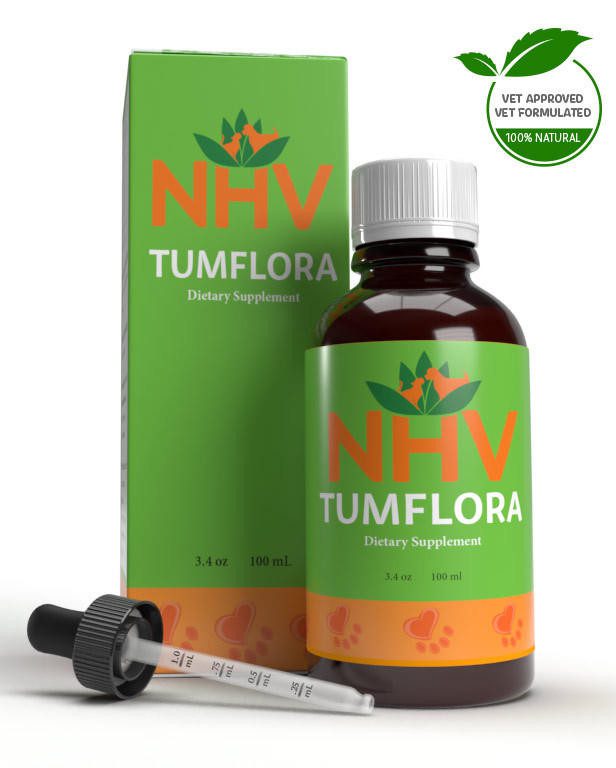
Natural Support for Inflammatory Bowel Disease in Cats
buy 2 and save $3
3 month supply for a small to medium size pet.
If your kitty’s fur is looking dull, they won’t eat their favorite treats and are suffering from vomiting, weight loss, diarrhea, and lethargy, your sweet kitty may have Inflammatory Bowel Disease (IBD in cats). NHV TumFlora can help naturally balance the intestinal flora in your kitty’s body and help maintain a healthy gut. It’s also a great proactive gut supplement for a happy, healthy furbaby.

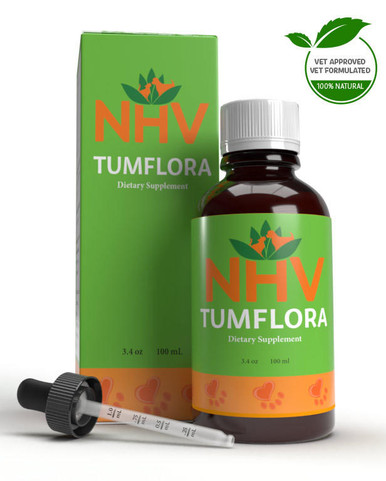
If your kitty’s fur is looking dull, they won’t eat their favorite treats and are suffering from vomiting, weight loss, diarrhea, and lethargy, your sweet kitty may have Inflammatory Bowel Disease (IBD in cats). NHV TumFlora can help naturally balance the intestinal flora in your kitty’s body and help maintain a healthy gut. It’s also a great proactive gut supplement for a happy, healthy furbaby.

Inflammatory Bowel Disease in cats (IBD) is a condition that mainly affects middle-aged to senior kitties, though it can occur at any age. IBD in cats is caused by an inflammatory response to an irritated and inflamed GI tract.
How TumFlora Supports Inflammatory Bowel Disease in Cats
The exact causes of IBD in cats are unknown, however, evidence does suggest that it may arise from an abnormal interaction between bacterial populations in the intestines, diet, a compromised immune system, and other environmental factors as well as genetic abnormalities. TumFlora helps support the body on a variety of levels, which helps address this complex problem.
To help address the imbalance of bacterial populations in the intestines, TumFlora’s blend of herbs work to improve natural intestinal flora. Herbs like licorice and ashwagandha offer support for the immune system, while vitamin and mineral dense herbs like slippery elm and oregon grape help improve nutrient absorption.
In addition to helping with IBD in cats, TumFlora can also help support your kitty if they are suffering from food allergies, gastrointestinal ulcers, and bacterial infections of the gut. Don’t wait for your kitty to have IBD for adding TumFlora, this gentle supplement can be used on a long term proactive basis to support your pet’s gut health.
Inflammatory response thickens the lining of the GI tract, which ends up affecting digestion, absorption of nutrients, and healthy bathroom habits. Cats with Irritable Bowel Disease can experience the following symptoms:
Symptoms of Inflammatory Bowel Disease in Cats
Your veterinarian may recommend treatment for intestinal parasites as well as a combination of medications and diet therapy as a first step. A novel protein, like rabbit or duck, may also be recommended. It takes time and your veterinarian may need to try several different therapies and medications. For a personalized veterinary nutrition plan for your little one, click here.
At NHV, we are a team of holistic veterinarians, pet experts and animal enthusiasts. Get in touch with us if you have any questions or concerns about your pup’s GI tract health or need some extra support.
Made with the finest, organically grown, or ethically harvested herbs. Made specifically for pets, vet-formulated, and vet approved.
Ashwagandha also known as Indian ginseng, is a root that contains a range of beneficial properties including anti-stress and anti-inflammatory action. It also helps defend against microorganisms and balances the immune system.
Boswellia has powerful anti-inflammatory properties and has been used in traditional herbal medicine to treat inflammatory bowel disease.
Chamomile has traditionally been used to help relieve indigestion, expel gas, ease nervous spasms, improve bile flow, and relieve vomiting due to inflammatory bowel disease in cats.
Fennel is an anti-inflammatory, nutritive herb that helps against microorganisms and soothes digestive upset, expels intestinal gas, and relaxes stomach cramps or spasms.
Indian Gooseberry is prized in Ayurvedic medicine for its many health benefits. It may help regulate cholesterol levels, and soothe nausea.
Licorice has been used for centuries for its immunostimulant and anti-inflammatory properties to support against microorganisms, digestion and general well-being. It contains free radical scavengers to help promote healing.
Marshmallow contains demulcent, and diuretic properties. It helps defend against microorganisms, controls bacterial infection, protects the intestinal mucosa, and soothes inflamed mucosa. It has been used in herbalism as a treatment for gastroenteritis.
Oregon Grape contains anti-inflammatory, anti-bacterial, and anti-fungal properties with strong affinities to the liver, digestive system, and mucous membranes.
Slippery Elm contains anti-inflammatory properties and is rich in vitamins and minerals. It is beneficial for gastritis, colitis, duodenal ulcers, and diarrhea.
Select your pet's weight to determine the correct dose.
To be taken twice daily. Determine your pet’s weight and then use the easy chart below to determine the correct dose. This is the minimum dosage.
Pet's Weight Dosage
0 - 15 lb = 0.5 ml
16 - 30 lb = 1.0 ml
31 - 45 lb = 1.5 ml
46 - 60 lb = 2.0 ml
61 - 75 lb = 2.5 ml
Over 75 lb = 3.0 ml
How to Administer
Shake well before use. The easiest method is to use the dropper provide and places the drops into your pet’s food or favorite treat. You can also use the dropper and squirt directly into the pet’s mouth.
Some pets can be finicky, if this occurs consider hiding the drops in foods most pet’s love such as fish, chicken or yogurt or a favorite treat. If your pet only eats dry food then soak a few kibbles at feeding time.
For Best Results
Herbal dietary supplements are beneficial to the health and wellbeing of your pet and are safe for long-term use. Every pet responds to natural herbal supplements differently, therefore it is important to be consistent and administer the product daily. Supplements generally take two to four weeks to take effect, however this will vary from one animal to the next.
Product Storage
All NHV Natural Pet Products are pure herbal extracts and contain no artificial additives, preservatives or coloring. Shelf life after opening is 6 months and must be refrigerated after opening.
Cautions and Contraindications: Do not use TumFlora in pregnant or nursing animals. Speak to your vet before using our products. A second visit is recommended if your pet’s condition does not improve, or deteriorates after continued use of the supplements.
Inflammatory Bowel Disease in cats (IBD) is a condition that mainly affects middle-aged to senior kitties, though it can occur at any age. IBD in cats is caused by an inflammatory response to an irritated and inflamed GI tract.
How TumFlora Supports Inflammatory Bowel Disease in Cats
The exact causes of IBD in cats are unknown, however, evidence does suggest that it may arise from an abnormal interaction between bacterial populations in the intestines, diet, a compromised immune system, and other environmental factors as well as genetic abnormalities. TumFlora helps support the body on a variety of levels, which helps address this complex problem.
To help address the imbalance of bacterial populations in the intestines, TumFlora’s blend of herbs work to improve natural intestinal flora. Herbs like licorice and ashwagandha offer support for the immune system, while vitamin and mineral dense herbs like slippery elm and oregon grape help improve nutrient absorption.
In addition to helping with IBD in cats, TumFlora can also help support your kitty if they are suffering from food allergies, gastrointestinal ulcers, and bacterial infections of the gut. Don’t wait for your kitty to have IBD for adding TumFlora, this gentle supplement can be used on a long term proactive basis to support your pet’s gut health.
Inflammatory response thickens the lining of the GI tract, which ends up affecting digestion, absorption of nutrients, and healthy bathroom habits. Cats with Irritable Bowel Disease can experience the following symptoms:
Symptoms of Inflammatory Bowel Disease in Cats
Your veterinarian may recommend treatment for intestinal parasites as well as a combination of medications and diet therapy as a first step. A novel protein, like rabbit or duck, may also be recommended. It takes time and your veterinarian may need to try several different therapies and medications. For a personalized veterinary nutrition plan for your little one, click here.
At NHV, we are a team of holistic veterinarians, pet experts and animal enthusiasts. Get in touch with us if you have any questions or concerns about your pup’s GI tract health or need some extra support.
Made with the finest, organically grown, or ethically harvested herbs. Made specifically for pets, vet-formulated, and vet approved.
Ashwagandha also known as Indian ginseng, is a root that contains a range of beneficial properties including anti-stress and anti-inflammatory action. It also helps defend against microorganisms and balances the immune system.
Boswellia has powerful anti-inflammatory properties and has been used in traditional herbal medicine to treat inflammatory bowel disease.
Chamomile has traditionally been used to help relieve indigestion, expel gas, ease nervous spasms, improve bile flow, and relieve vomiting due to inflammatory bowel disease in cats.
Fennel is an anti-inflammatory, nutritive herb that helps against microorganisms and soothes digestive upset, expels intestinal gas, and relaxes stomach cramps or spasms.
Indian Gooseberry is prized in Ayurvedic medicine for its many health benefits. It may help regulate cholesterol levels, and soothe nausea.
Licorice has been used for centuries for its immunostimulant and anti-inflammatory properties to support against microorganisms, digestion and general well-being. It contains free radical scavengers to help promote healing.
Marshmallow contains demulcent, and diuretic properties. It helps defend against microorganisms, controls bacterial infection, protects the intestinal mucosa, and soothes inflamed mucosa. It has been used in herbalism as a treatment for gastroenteritis.
Oregon Grape contains anti-inflammatory, anti-bacterial, and anti-fungal properties with strong affinities to the liver, digestive system, and mucous membranes.
Slippery Elm contains anti-inflammatory properties and is rich in vitamins and minerals. It is beneficial for gastritis, colitis, duodenal ulcers, and diarrhea.
Select your pet's weight to determine the correct dose.
To be taken twice daily. Determine your pet’s weight and then use the easy chart below to determine the correct dose. This is the minimum dosage.
Pet's Weight Dosage
0 - 15 lb = 0.5 ml
16 - 30 lb = 1.0 ml
31 - 45 lb = 1.5 ml
46 - 60 lb = 2.0 ml
61 - 75 lb = 2.5 ml
Over 75 lb = 3.0 ml
How to Administer
Shake well before use. The easiest method is to use the dropper provide and places the drops into your pet’s food or favorite treat. You can also use the dropper and squirt directly into the pet’s mouth.
Some pets can be finicky, if this occurs consider hiding the drops in foods most pet’s love such as fish, chicken or yogurt or a favorite treat. If your pet only eats dry food then soak a few kibbles at feeding time.
For Best Results
Herbal dietary supplements are beneficial to the health and wellbeing of your pet and are safe for long-term use. Every pet responds to natural herbal supplements differently, therefore it is important to be consistent and administer the product daily. Supplements generally take two to four weeks to take effect, however this will vary from one animal to the next.
Product Storage
All NHV Natural Pet Products are pure herbal extracts and contain no artificial additives, preservatives or coloring. Shelf life after opening is 6 months and must be refrigerated after opening.
Cautions and Contraindications: Do not use TumFlora in pregnant or nursing animals. Speak to your vet before using our products. A second visit is recommended if your pet’s condition does not improve, or deteriorates after continued use of the supplements.
digestive support
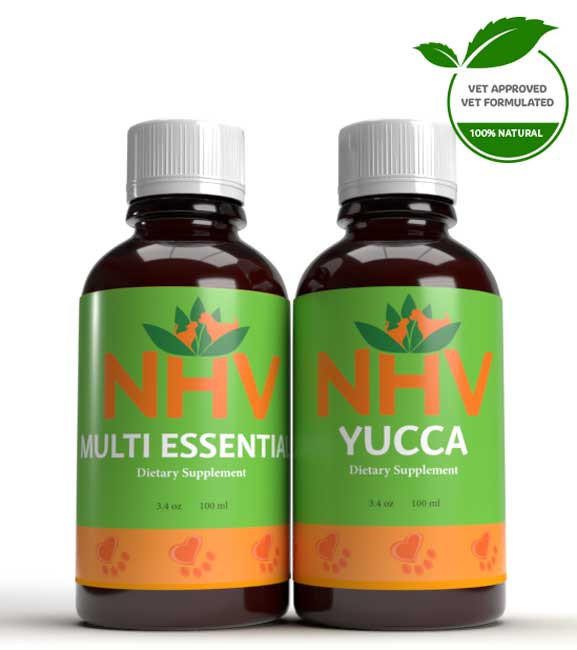
Yucca & Multi Essentials
bundle and save with pet expert kits
3 month supply for a small to medium size pet.
Just like humans, as our furkiddos age, their body may not be as good at breaking down food and absorbing vital nutrients. NHV’s Digestion Kit is a comprehensive bundle that helps to soothe inflammation, encourage better absorption, and stimulate metabolism.

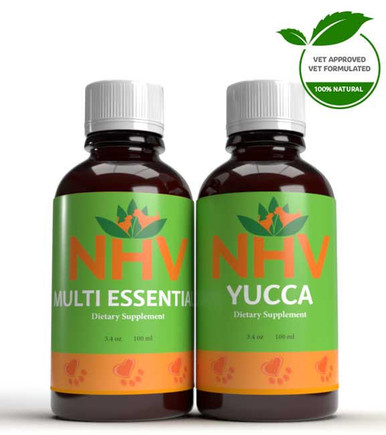
Just like humans, as our furkiddos age, their body may not be as good at breaking down food and absorbing vital nutrients. NHV’s Digestion Kit is a comprehensive bundle that helps to soothe inflammation, encourage better absorption, and stimulate metabolism.

Regardless of your furkiddo’s age, it’s never easy to see them slowing down and having difficulties with their health. If your furry friend is having a tough time with their digestion, then they may not be able to break down and absorb all of the nutrients necessary for maintaining healthy skin, fur and overall health. Our Digestion Kit is formulated to help fill nutritional voids, improve absorption and overall gastrointestinal health.
Just like humans, as our pets age, they may be a little less energetic. That's totally normal! We all require different levels of support at different stages in our lives. Our Digestion Kit contains Yucca, and Multi Essentials, which is a supplement bundle designed to help our pets better absorb nutrients and trigger metabolism. Yucca contains a high level of antioxidant properties that are beneficial for promoting healthy appetite and improving absorption. When it comes to cat sensitive stomach and gastrointestinal dog care, the herbs in Multi Essentials provide many key vitamins and minerals for building and maintaining healthy GI tract health, promoting healthy metabolism, and helping to reduce fatigue. Ingredients like chickweed and dandelion are effective digestive tonics that may help to enhance absorption while herbs like Oregon grape help to reduce indigestion and malabsorption.
It’s great to know that there are ways to support your furkiddo’s digestion naturally! Other than adding natural supports to their daily meals, if you’re wondering about options for gastrointestinal dog care and cat care, a personalized diet for your pet, created by Dr. Amanda, is another great way to support your furry friend!
Made with the finest, organically grown, or ethically harvested herbs. Made specifically for pets, vet-formulated, and vet approved.
Multi Essentials
Select your pet's weight to determine the correct dose.
To be taken twice daily. Determine your pet’s weight and then use the easy chart below to determine the correct dose. This is the minimum dosage.
Pet's Weight Dosage
0 - 15 lb = 0.5 ml
16 - 30 lb = 1.0 ml
31 - 45 lb = 1.5 ml
46 - 60 lb = 2.0 ml
61 - 75 lb = 2.5 ml
Over 75 lb = 3.0 ml
How to Administer
Shake well before use. The easiest method is to use the dropper provided and place the drops into your pet’s food or favorite treat. You can also use the dropper and squirt directly into the pet’s mouth. Some pets can be finicky, if this occurs consider hiding the drops in foods most pet’s love such as fish, chicken or yogurt or a favorite treat. If your pet only eats dry food then soak a few kibbles at feeding time.
For Best Results
Herbal dietary supplements are beneficial to the health and well-being of your pet and are safe for long-term use. Every pet responds to natural herbal supplements differently, therefore it is important to be consistent and administer the product daily. Supplements generally take two to four weeks to take effect, however this will vary from one animal to the next.
Product Storage
All NHV Natural Pet Products are pure herbal extracts and contain no artificial additives, preservatives or coloring. Shelf life after opening is 6 months and must be refrigerated after opening.
All information provided by NHV Natural Pet Products is for educational purposes only.
Regardless of your furkiddo’s age, it’s never easy to see them slowing down and having difficulties with their health. If your furry friend is having a tough time with their digestion, then they may not be able to break down and absorb all of the nutrients necessary for maintaining healthy skin, fur and overall health. Our Digestion Kit is formulated to help fill nutritional voids, improve absorption and overall gastrointestinal health.
Just like humans, as our pets age, they may be a little less energetic. That's totally normal! We all require different levels of support at different stages in our lives. Our Digestion Kit contains Yucca, and Multi Essentials, which is a supplement bundle designed to help our pets better absorb nutrients and trigger metabolism. Yucca contains a high level of antioxidant properties that are beneficial for promoting healthy appetite and improving absorption. When it comes to cat sensitive stomach and gastrointestinal dog care, the herbs in Multi Essentials provide many key vitamins and minerals for building and maintaining healthy GI tract health, promoting healthy metabolism, and helping to reduce fatigue. Ingredients like chickweed and dandelion are effective digestive tonics that may help to enhance absorption while herbs like Oregon grape help to reduce indigestion and malabsorption.
It’s great to know that there are ways to support your furkiddo’s digestion naturally! Other than adding natural supports to their daily meals, if you’re wondering about options for gastrointestinal dog care and cat care, a personalized diet for your pet, created by Dr. Amanda, is another great way to support your furry friend!
Made with the finest, organically grown, or ethically harvested herbs. Made specifically for pets, vet-formulated, and vet approved.
Multi Essentials
Select your pet's weight to determine the correct dose.
To be taken twice daily. Determine your pet’s weight and then use the easy chart below to determine the correct dose. This is the minimum dosage.
Pet's Weight Dosage
0 - 15 lb = 0.5 ml
16 - 30 lb = 1.0 ml
31 - 45 lb = 1.5 ml
46 - 60 lb = 2.0 ml
61 - 75 lb = 2.5 ml
Over 75 lb = 3.0 ml
How to Administer
Shake well before use. The easiest method is to use the dropper provided and place the drops into your pet’s food or favorite treat. You can also use the dropper and squirt directly into the pet’s mouth. Some pets can be finicky, if this occurs consider hiding the drops in foods most pet’s love such as fish, chicken or yogurt or a favorite treat. If your pet only eats dry food then soak a few kibbles at feeding time.
For Best Results
Herbal dietary supplements are beneficial to the health and well-being of your pet and are safe for long-term use. Every pet responds to natural herbal supplements differently, therefore it is important to be consistent and administer the product daily. Supplements generally take two to four weeks to take effect, however this will vary from one animal to the next.
Product Storage
All NHV Natural Pet Products are pure herbal extracts and contain no artificial additives, preservatives or coloring. Shelf life after opening is 6 months and must be refrigerated after opening.
All information provided by NHV Natural Pet Products is for educational purposes only.
Published: July 15, 2025